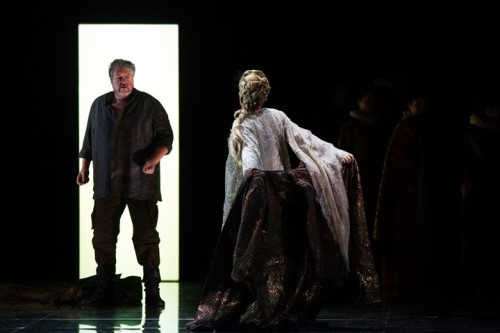 Germany Verdi, Otello: Staatskapelle Dresden, Chorus of Dresden State Opera / Christian Thielemann (conductor), Semperoper, Dresden, 1.3.2017. (JMI)
Germany Verdi, Otello: Staatskapelle Dresden, Chorus of Dresden State Opera / Christian Thielemann (conductor), Semperoper, Dresden, 1.3.2017. (JMI)

Cast:
Otello – Stephen Gould
Desdemona – Dorothea Röschmann
Iago – Andrzej Dobber
Cassio – Antonio Poli
Emilia – Christa Mayer
Ludovico – Georg Zeppenfeld
Rodrigo – Robin Yujoong Kim
Montano – Martin–Jan Nijhov
Herald –- Alexandros Stavrakakis
Production;
Director – Vincent Boussard
Sets – Vincent Lemaire
Costumes – Christian Lacroix
Lighting – Guido Levi
It was worth a special trip to Dresden to watch Christian Thielemann conducting a Verdi opera, and Otello in particular. Musically, my expectations have been fully met, although neither the stage production nor the cast quite lived up to the brilliant music. It must be noted that the forced cancellations of two of the three main singers created an obstacle that is difficult to overcome for any opera house.
I have a special admiration for Christian Thielemann and Kirill Petrenko in German opera, but there have been not many opportunities to see them conduct Italian opera. In fact, I believe this is the first time I’ve seen Mr. Thielemann conducting Verdi in an opera house. The sound that came from the pit of the Semperoper was one that cannot easily be forgotten: his tempos were always lively but not overly accelerated. When listening to a version like this, one realizes the enormous musical importance of Otello. I have rarely enjoyed anyone’s conducting so much and seldom heard an orchestral sound like that of the Dresden Staatskapelle under his baton. The performance of the chorus was also noteworthy.
The cast that was initially announced included South African tenor Johan Botha as Otello and Russian baritone Dmitri Hvorostovsky as the evil Iago. Sadly, the former passed away last September after a short struggle with cancer, and the latter has had to cancel his commitments to focus on treating the cancer from which he is suffering. Substitutions are never easy, especially when it involves first-rate singers as in this case. To this must be added the circumstances which made it all the more painful.
American tenor Stephen Gould took over the part of Otello. With his powerful, bright voice, he shines in Wagner’s operas and is possibly the best Siegfried, Tannhäuser or Tristan of the present day. But this didn’t translate with Verdi: his Otello was strong but strident, somewhat short on expressiveness and very tight at the top. It’s not that he doesn’t have those top notes, but his forceful singing took its toll on several occasions. Things did not go smoothly in ‘Esultate’, and the same can be said of his monologues, especially ‘Dio mi potevi scagliar’.
German soprano Dorothea Röschmann is one of the most recognized Mozart sopranos today, but her appearances in the Verdi repertoire are scarce. At the Salzburg Easter Festival last year she debuted as Desdemona in this very production. She has an attractive, well-handled voice and exhibits no problems while the tessitura is in the middle range but, unlike with Mozart roles, here she has to ascend to the top notes. Her voice there is rather shrill, with open sounds on more than one occasion.
Polish baritone Andrzej Dobber replaced Mr. Hvorostovsky as Iago. He was totally competent in the part, but vocally he doesn’t offer any special brilliance.
In the secondary roles, Antonio Poli was a correct Cassio; Georg Zeppenfeld was a real luxury as Ludovico; and the same can be said of Christa Mayer in the part of Emilia. Robin Yujoong Kim was a suitable Rodrigo, Martin-Jan Nijhov a sonorous Montano and Alexandros Stavrakakis a well-suited Herald.
The Boussard staging is a co-production of the Salzburg Easter Festival and the Dresden Opera. It seems rather lifeless, with weak direction of the actors, especially in the crowd scenes. The Angel of Death is continually present on stage but not of particular relevance. The sets are rather minimalist, with bare walls and props that are not always convincing, such as the large candle-lit table in Act II. Desdemona’s room is a small cubicle in which the singers cannot move. The costumes mix up epochs: the soloists in late-nineteenth-century dress and members of the chorus in sixteenth-century apparel. The best part is the lighting: it takes advantage of the production’s darkness. Overall, the staging holds little interest, and the final scene is absurd: Desdemona is no longer on stage when Otello sings ‘Un bacio ancora’.
The Semperoper was not sold out, and the audience was not particularly enthusiastic at the final bows. The biggest ovations were for Christian Thielemann and the Staatskapelle.
José M. Irurzun

I write in relation to your comment about hearing Thielemann conduct Verdi for the first time. Didn’t you do a review of Thielemann conducting ‘Boccanegra’ at the Semperoper about three years ago? I recall you being very impressed with his conducting. Also if you hear his Verdi Requiem from Salzburg on YouTube, then his conducting may also impress you there.
Very well spotted James, yes you are right. Thank you for correcting José and S&H. Sometimes we – and I include myself – can see TOO much that it is possible forget!
No problem! It happens to us all, including myself. I think José is correct in that Thielemann gets unfairly chained to this German music only reputation.
Also having been to the Semperoper myself a few times over the past two or three years, I would agree that whilst musical standards are high, the productions can be lacking.
I think Jim we were at the same ‘Die Walküre’ performance last year which was a very cluttered staging. However, Thielemann took it to the highest musical level.